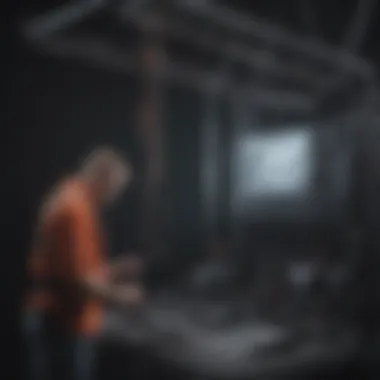Unveiling the Intricacies of Stagehand Touring Jobs: A Comprehensive Insight


Stagehand touring jobs are an integral part of the entertainment industry, contributing significantly to the flawless execution of stage productions. These professionals work behind the scenes to ensure the seamless technical operations that bring live shows to life. From setting up elaborate stage designs to troubleshooting equipment issues, stagehands play a crucial role in creating unforgettable experiences for audiences.
Tech Trend Analysis
Amidst the evolution of technology in live productions, stagehand touring jobs are experiencing a shift towards automation and digitalization. The current trend in the industry is leaning towards utilizing advanced audio-visual equipment and software to streamline production processes. This trend not only enhances efficiency but also offers new creative possibilities for stagehands.
Product Reviews
In the realm of stagehand touring jobs, the primary 'product' is the execution of seamless live performances. The features and specifications of this 'product' involve proficiency in rigging, lighting, sound management, and stage setup. Through performance analysis, stagehands are evaluated based on their ability to work cohesively with production teams and adapt to dynamic live show environments.
How-To Guides
For aspiring individuals looking to venture into stagehand touring jobs, the journey begins by understanding the fundamental aspects of stage production. This section serves as an introductory guide, providing step-by-step instructions on rigging techniques, equipment handling, safety protocols, and efficient communication within a production team. Tips and tricks shared here aim to maximize efficiency and effectiveness in executing live shows.
Industry Updates
Recent developments in the entertainment industry have propelled stagehand touring jobs into a realm of innovation and adaptability. The analysis of market trends reveals a growing demand for skilled stagehands who can navigate the complexities of modern stage productions. These developments impact not only businesses within the industry but also consumers, who are exposed to higher quality and more immersive live experiences.
Introduction to Stagehand Touring Jobs
In exploring the realm of stagehand touring jobs, it becomes evident that these roles are fundamental to the seamless execution of elaborate stage productions within the entertainment industry. Stagehand touring jobs encompass a diverse range of responsibilities that are crucial for the success of any touring production. This section serves as a gateway to understanding the intricacies and significance of these roles, shedding light on the behind-the-scenes magic that brings live performances to life.
Defining Stagehand Touring Jobs
When delving into defining stagehand touring jobs, we unravel the multifaceted nature of these positions. From setting up equipment to coordinating backstage operations, stagehand touring jobs involve tasks that are essential for the smooth running of touring productions. This subsection aims to provide a clear understanding of the core duties and scope of work associated with being a stagehand in a touring capacity.


Importance of Stagehands in Touring Productions
The importance of stagehands in touring productions cannot be overstated. These professionals are the backbone of any live show, seamlessly blending technical expertise with physical prowess to ensure that every aspect of the production runs flawlessly. Their contributions extend far beyond just setting up and dismantling stages; they are integral to the overall success and safety of the performers and crew. This section highlights the indispensable role that stagehands play in the dynamic world of touring productions.
Evolution of Stagehand Roles in the Entertainment Industry
The evolution of stagehand roles in the entertainment industry reflects the changing landscape of live performances and technological advancements. From traditional manual labor to leveraging cutting-edge equipment and automation, stagehands have evolved to meet the demands of modern touring productions. This evolution is not only fascinating but also indicative of the industry's continuous strive for innovation and excellence. By exploring the historical shifts in stagehand roles, we gain a deeper appreciation for the adaptability and expertise required in this dynamic field.
Skills and Qualifications
In the realm of stagehand touring jobs, possessing the right skill set and qualifications is paramount. This section delves into the critical elements that make up an adept stagehand. Technical proficiency stands out as a core requirement in this field. Being well-versed in the handling of various technical equipment used in stage productions is essential for ensuring seamless performances. Additionally, physical fitness and endurance play a key role, given the physically demanding nature of the job. Stagehands often need to lift heavy equipment, work in tight spaces, and maintain stamina throughout long hours of setup and teardown. Attention to detail is non-negotiable for stagehands. From accurately following setup instructions to identifying and rectifying technical issues swiftly, a keen eye for detail can make all the difference in the success of a production. These qualities collectively contribute to the effectiveness and professionalism of a stagehand, making them indispensable assets in the world of entertainment.
Job Responsibilities
In the context of stagehand touring jobs, understanding and fulfilling job responsibilities are crucial aspects that ensure the smooth execution of live events and performances. Stagehands are the backbone of any production, responsible for a wide array of tasks ranging from stage setup to technical support. The meticulous attention to detail and the ability to work under pressure are defining characteristics of successful stagehands. Without efficient job responsibilities, the entire production could face logistical challenges and setbacks.
Stage Setup and Teardown
Stage setup and teardown are integral components of a stagehand's responsibilities during touring productions. This process involves constructing and dismantling stage elements, such as platforms, backdrops, and set pieces, according to precise instructions. Attention to detail is paramount to ensure that the stage is set up accurately and safely for performers. Swift and efficient teardown post-event is equally important to facilitate a seamless transition to the next venue. Stagehands must coordinate closely with other crew members to execute these tasks effectively.
Equipment Maintenance
Equipment maintenance is a vital aspect of a stagehand's role to guarantee the proper functioning of technical gear throughout the tour. From sound systems to lighting fixtures, stagehands must conduct routine checks, repairs, and replacements to prevent technical malfunctions during live performances. Proficiency in troubleshooting equipment issues is essential to address any unforeseen challenges swiftly. Effective equipment maintenance not only ensures uninterrupted performances but also contributes to the overall success of the production.
Collaboration with Production Team


Collaboration with the production team is a key factor in the seamless execution of stagehand duties during touring productions. Clear communication and teamwork are essential to coordinate tasks effectively and address any on-site challenges promptly. Stagehands work closely with stage managers, audiovisual technicians, and other crew members to synchronize efforts and guarantee a cohesive performance. Understanding each team member's role and responsibilities fosters a harmonious working environment, creating a synergy that enhances the overall quality of the production.
Work Environment and Challenges
In this comprehensive guide exploring stagehand touring jobs, delving into the work environment and challenges is pivotal for aspirants seeking insights regarding this dynamic profession. Understanding the intricacies of the work environment and challenges equips individuals with the necessary preparation to thrive in the industry. Stagehands encounter a unique setting where irregular hours and extensive travel are inherent aspects of the job, requiring adaptability and resilience. The importance of a conducive work environment that fosters growth and creativity cannot be overstated. Navigating challenges effectively contributes to the professional development of stagehands, shaping them into adept problem-solvers in the entertainment industry.
Irregular Hours and Travel
The nature of stagehand touring jobs dictates irregular hours and extensive travel, presenting both challenges and opportunities for professionals in this field. Stagehands must be prepared to work during unconventional hours, including evenings, weekends, and holidays, to accommodate the production schedules of touring shows. Travel is a fundamental component of stagehand roles, as productions move from one location to another, requiring team members to adapt to new environments swiftly. Managing irregular working hours and frequent travel demands a high level of organization and commitment from stagehands to ensure the seamless execution of productions.
Physical Demands and Safety Concerns
With the physical demands and safety concerns prevalent in stagehand touring jobs, maintaining optimal health and safety standards is paramount. Stagehands engage in strenuous activities such as lifting heavy equipment, assembling stage structures, and ensuring the overall safety of performers and crew members. Prioritizing physical fitness and adhering to strict safety protocols are essential to mitigate the risks associated with the job. Vigilance in promoting a safe working environment plays a definitive role in preventing accidents and injuries during stage productions.
Adapting to Different Venues and Setups
Adapting to different venues and setups is a core competency required of stagehands in touring productions. Each venue presents unique challenges in terms of space constraints, technical specifications, and overall layout, necessitating quick problem-solving skills and adaptability. Stagehands must familiarize themselves with diverse production setups and be prepared to adjust their strategies according to varying circumstances. Flexibility and resourcefulness are key attributes that enable stagehands to excel in their roles, ensuring the seamless execution of performances across different venues and setups.
Career Prospects and Growth Opportunities
When delving into the realm of stagehand touring jobs, it is essential to understand the crucial aspect of career prospects and growth opportunities. The industry offers a plethora of avenues for professional advancement and development, making it an attractive field for individuals seeking to grow and excel in their careers. Carefully navigating through the various opportunities available can lead to a fulfilling and successful career in the stagehand industry.
Advancement Paths in Stagehand Industry
Exploring the advancement paths in the stagehand industry provides valuable insights into the potential growth trajectory for individuals working in this field. From starting as entry-level stagehands to progressing towards specialized roles such as head stagehand or production manager, there are diverse avenues for career progression. Gaining experience, honing technical skills, and showcasing competence in handling complex productions are essential steps towards climbing the career ladder in the stagehand industry.


Additional Training and Certifications
In the competitive landscape of stagehand touring jobs, acquiring additional training and certifications can significantly enhance one's credibility and marketability. Pursuing courses in rigging, audiovisual technology, or safety protocols can provide a competitive edge in securing desirable job opportunities. Professional certifications such as OSHA (Occupational Safety and Health Administration) standards or specialized training from industry organizations can further validate one's expertise and proficiency in the field.
Networking and Building Professional Connections
Building a robust professional network is instrumental in advancing one's career prospects in the stagehand industry. Establishing connections with industry professionals, production companies, and venue managers can lead to valuable career opportunities and collaborations. Attending industry events, workshops, and conferences enables stagehands to showcase their skills, build rapport with key figures, and stay abreast of industry trends. Cultivating strong professional relationships can open doors to exciting projects and career growth in the dynamic world of stagehand touring jobs.
Job Application and Preparation
In the vast landscape of stagehand touring jobs, the aspect of job application and preparation holds paramount significance. This section serves as a compass guiding aspiring stagehands through the intricate process of entering this dynamic industry. Understanding the nuances of crafting a noteworthy resume, acing job interviews, and showcasing relevant experience and skills is crucial. Effective job application and preparation lay the foundation for a successful career in the world of stagehand touring.
Crafting an Impressive Resume
Crafting an impressive resume serves as the gateway to securing coveted stagehand touring positions. A well-curated resume should highlight technical proficiency, physical capabilities, attention to detail, and prior experience in the entertainment industry. Emphasizing critical skills such as equipment handling, stage setup, and teamwork is essential. Additionally, showcasing any relevant certifications or training programs can add an extra edge to the resume, increasing the chances of standing out amidst the competition.
Preparing for Job Interviews
Preparing for job interviews is a crucial step in the job application process for aspiring stagehands. Familiarizing oneself with common interview questions, rehearsing responses, and demonstrating a passion for the role can significantly impact interview outcomes. Moreover, understanding the expectations of stagehand roles, problem-solving scenarios, and adapting to different production environments are vital aspects to prepare for. Confidence, professionalism, and a detailed knowledge of technical processes can greatly enrich the interview experience, showcasing readiness for the challenges of the profession.
Showcasing Relevant Experience and Skills
Showcasing relevant experience and skills in job applications allows stagehand aspirants to substantiate their qualifications. Highlighting past roles in stage setup, equipment maintenance, or collaboration with production teams can illustrate practical knowledge and expertise. Articulating specific achievements, challenges overcome, and innovative solutions implemented can reinforce credibility and competency. Moreover, detailing technical proficiencies, physical endurance, and adaptability to high-pressure situations can provide a comprehensive overview of one's capabilities, boosting confidence in potential employers. Effectively showcasing experience and skills is integral to presenting a compelling case for why a candidate is the ideal fit for a stagehand touring position.
Conclusion
As we conclude this comprehensive guide on stagehand touring jobs, it becomes evident that the world of stagehand professionals is a vital backbone to the seamless execution of elaborate productions in the entertainment industry. Understanding the duties, challenges, and growth opportunities within this field is essential for anyone aspiring to embark on a career in stagehand touring. By embracing the nuances of this dynamic profession, individuals can forge a path towards success and make significant contributions to the entertainment landscape.
Embracing the World of Stagehand Touring Jobs
Stagehand touring jobs offer a unique blend of excitement, challenges, and skill development for individuals passionate about live productions and technical operations. Embracing this career path involves immersing oneself in a fast-paced environment where attention to detail, physical stamina, and teamwork are paramount. Professionals in this field play a critical role in ensuring that every aspect of a stage production runs smoothly, from setting up equipment to troubleshooting technical issues on the spot.
By delving into the world of stagehand touring jobs, individuals can gain a profound appreciation for the coordination and precision required behind the scenes of dazzling live performances. The hands-on nature of the role provides an unmatched opportunity to work closely with cutting-edge equipment, diverse production teams, and talented performers, fostering both personal growth and professional fulfillment. Embracing the challenges and rewards of this dynamic profession can lead to a gratifying career journey filled with innovation, learning, and a deep sense of contribution to the entertainment industry.



